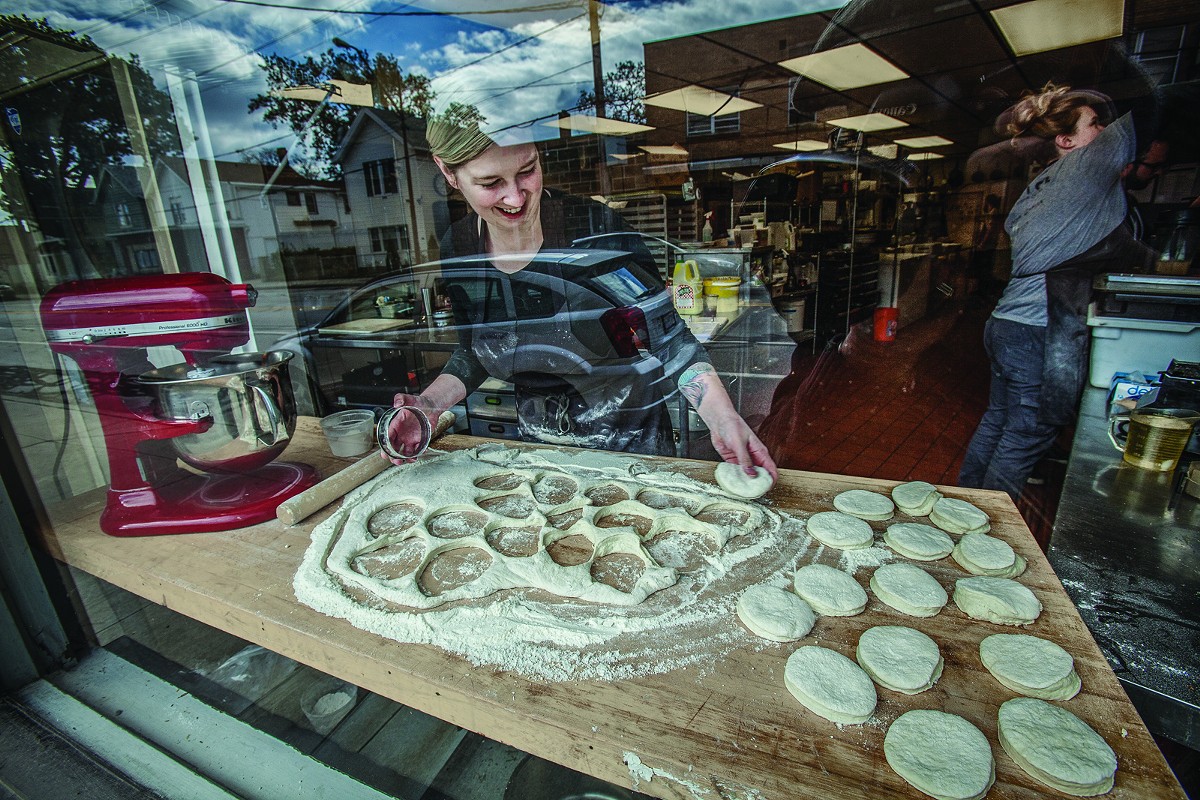In the not-too-distant past, every great restaurant meal began with a basket of warm, house-baked bread and was capped off by a sweet, elegant flourish, both of which sprang forth from the hands of a skilled in-house pastry chef. These days, that bread and dessert more than likely began life as a frozen product that arrived on the back of a truck, says Ben Bebenroth, chef and owner of Spice Kitchen, Spice Catering, and Spice Acres farm.
"Probably 90 percent of Cleveland restaurants are using premade products," he estimates. "It's a position that you can easily cut up, reassign and reallocate your spend as opposed to spending it on a talented, dedicated professional. I don't think it's a craft that's as highly prized anymore because there are easy workarounds."
Those workarounds, he reports, range from using frozen par-baked breads and Sysco brand cakes and pies to simply relying on local businesses who do it for a living. Thanks to bakeries like Stone Oven, On the Rise, and Blackbird, ice cream shops like Mitchell's and Mason's Creamery, and a whole host of cottage dessert providers, restaurant owners manage to cobble together an employee-free solution to their sweet and savory pastry needs.
Unlike most of his colleagues, Bebenroth does happen to employ a fulltime pastry chef. Emily Kosel grinds the ancient grains that go into the long-fermented breads, she bakes English muffins from scratch for weekend brunch, she makes the tartlet shells that are filled and passed at bucolic Plated Landscape dinners, and she crafts the attractive plated desserts that are served at the farm-to-table restaurant in Detroit Shoreway. Thanks to his multi-faceted enterprise, Bebenroth is able to justify and subsidize the added expense.
"If we didn't have the additional revenue streams, there would be no fucking way we could do it," he says.
But we can't pin the decline of the in-house pastry chef solely on the backs of parsimonious restaurant owners. If you want to know why so many restaurants began ditching their highly skilled pastry chefs in the first place, simply look in the mirror and ask yourself what you'd like for dessert.
"Unfortunately, when it comes to desserts, people just want you to play the hits," says Ange Lupica, an industrious pastry professional who splits her time between Cleveland Bagel and Sweet Tooth Confections, her own wholesale sweets business. "If, at the end of the day, your customers are only asking for cheesecake, brownie, cookie, pie ... do you really need to pay someone to do that?"
In what might seem an odd contradiction of spirit, the very same diner who just devoured a progressive meal of fried chicken livers with wild-berry compote followed by braised heirloom pork belly garnished with foraged chanterelles will demonstrate no such pluck when it comes to dessert. For him or her, the time for bravery has passed and only a slice of old-fashioned apple pie will do, thank you very much.
"I think that desserts are so deeply rooted with childhood foods that you're always competing with these amazing things that they had as a child," Lupica proposes. "We are competing with Grandma's pies. They want the purest form of what they remember and they want us to make it just like that."
For restaurants that hope to stand out from the crowd, premade pastry from a third-party provider will never suffice, regardless of how much care and attention went into crafting them. If the restaurant down the block can purchase the very same desserts, how in the world will that practice differentiate you from your competitors?
"Every restaurant has a vibe, a personality, and the pastry should correspond with that, otherwise it's really disjointed," explains Summer Genetti, Lola's pastry chef for the past five years. "At the restaurant we try to take classic American flavors that you might have grown up with but present them in a more sophisticated and refined way that is sometimes cheeky but always delicious, comforting and something you're really going to enjoy."
Although she was referring specifically to the dessert program, Genetti's description would be equally accurate with respect to the savory side of things, proving her point about symmetry of character. What is a beef cheek pierogi, after all, if not a classic American flavor presented in a more sophisticated and refined way?
Genetti might be Cleveland's best hope when it comes to the future of the local pastry chef. Unlike numerous doubting Thomases, she believes that the worst is behind us and the future is looking very sweet indeed.
"The pastry chef is starting to come back," she says. "People are becoming more interested in artisan breads, more interested in single-origin chocolates. While pastry jobs have been slower to manifest themselves, artisan bakeries, patisseries, chocolaterias and even legit doughnut shops are becoming more prolific, and that is only a good thing for the pastry community at large."
Genetti sees it as a long game, one in which both pastry chefs and diners play equal and equally important parts.
"My hope is that if I do everything to the best of my abilities then somebody is going to come in, who maybe didn't understand what a pastry chef and plated desserts are all about, and will leave with a higher appreciation of those things and will then demand better, which will then make everyone else have to rise up and address it and hire someone to make desserts," she argues.
Along those same lines, Lupica sees the process as a two-way street, one that requires a solid foundation of trust.
"We need to give our customers more credit and our customers need to trust us, because we can do more than just brownies and cookies and cheesecake," she urges. "If you're going out and spending money and having this whole experience, then let us give it to you all the way to the end."










